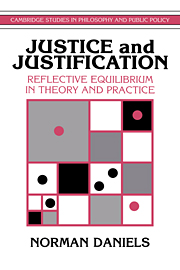Book contents
- Frontmatter
- Contents
- Preface
- 1 Introduction: Reflective equlibrium in theory and practice
- PART I
- PART II
- 9 Health-care needs and distributive justice
- 10 Equality of what: Welfare, resources, or capabilities?
- 11 Determining “medical necessity” in mental health practice, with James E. Sabin
- 12 The prudential life-span account of justice across generations
- 13 Problems with prudence
- 14 Merit and meritocracy
- 15 Rationing fairly: Programmatic considerations
- 16 Wide reflective equilibrium in practice
- Index
13 - Problems with prudence
Published online by Cambridge University Press: 01 February 2010
- Frontmatter
- Contents
- Preface
- 1 Introduction: Reflective equlibrium in theory and practice
- PART I
- PART II
- 9 Health-care needs and distributive justice
- 10 Equality of what: Welfare, resources, or capabilities?
- 11 Determining “medical necessity” in mental health practice, with James E. Sabin
- 12 The prudential life-span account of justice across generations
- 13 Problems with prudence
- 14 Merit and meritocracy
- 15 Rationing fairly: Programmatic considerations
- 16 Wide reflective equilibrium in practice
- Index
Summary
CHALLENGES TO THE CLASSICAL MODEL
The Prudential Life-span Account rests on two assumptions which I have treated so far as uncontroversial. The first assumption is that there is an important difference between distributive problems that cross the boundaries between persons, on the one hand, and problems that involve allocation within a life (between the stages of a life), on the other. The elaborate “frame” I constructed to isolate the age-group problem from interpersonal transfers of goods is motivated by the view that persons are basic entities for purposes of the theory of justice. For example, taking goods from one person to benefit another requires justification. More generally, deciding which inequalities between persons are justifiable is the central issue in distributive justice. By showing that the problem of distribution between the young and the old, which appears to be interpersonal, can be reduced to a problem of intrapersonal, prudential allocation, I try to replace a more complex and problematic issue with a less problematic one. If the boundaries between persons are not so important, or if similar problems arise for distributions within a life as between them, then the motivation for my strategy is undermined.
The second assumption that I have treated as uncontroversial is this: Rationality requires that we show equal concern for all parts of our (future) lives. Parfit (1984, 313) refers to this assumption as the Requirement of Equal Concern.
- Type
- Chapter
- Information
- Justice and JustificationReflective Equilibrium in Theory and Practice, pp. 284 - 301Publisher: Cambridge University PressPrint publication year: 1996
- 1
- Cited by

